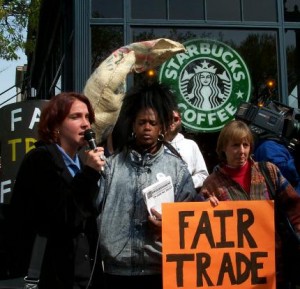 There are many things to be thankful for in 2012, starting with the fact that the world didn’t end on December 21 and that we don’t have to witness the inauguration of Mr. One-Percent Mitt Romney. The global economic crisis continued to hit hard, but people have been taking to the streets around the world, from students in Chile to indigenous activists in Canada to anti-austerity workers in Europe. And while the excitement of the Arab world uprisings has been tempered by divisions and losses, the struggles are far from over.
There are many things to be thankful for in 2012, starting with the fact that the world didn’t end on December 21 and that we don’t have to witness the inauguration of Mr. One-Percent Mitt Romney. The global economic crisis continued to hit hard, but people have been taking to the streets around the world, from students in Chile to indigenous activists in Canada to anti-austerity workers in Europe. And while the excitement of the Arab world uprisings has been tempered by divisions and losses, the struggles are far from over.
Here are some US and global issues that experienced newfound gains in 2012.
1. While conservatives launched vicious attacks on women’s rights, it backfired—and fired up the pro-choice base! US voters elected the highest number of women to Congress ever, including the first openly lesbian senator (Tammy Baldwin), the first Asian-American senator (Mazie Hirono) and first senator to make the banks tremble, Elizabeth Warren! Voters also rejected 4 crazy candidates who called for limiting a woman’s right to choose—including the resounding defeat by Missouri Senator Claire McCaskill over Mr. Legitimate Rape Todd Akin. Don’t forget that when Susan G. Komen for the Cure announced it would no longer fund Planned Parenthood, it got so heartily trounced that it caved in than seventy-two hours later. And stay tuned for the 2013 global women rising – a billion of us demanding an end to violence against women on February 14!
2. Immigrant rights groups, especially young Latinos, mobilized and took great risks to force a change in attitude—and a thaw in policy. They fasted and caravanned and marched and knocked on doors. They pushed the administration and in June, just before the election, President Obama announced a new immigration policy that allows some undocumented students to avoid deportation and receive work authorization when they apply for deferred action. While not nearly enough, especially in light of this administration’s record rate of deportations, a mobilized immigrant community with significant voting power stands poised to make more impactful changes in U.S. immigration policy next year.
3. More money flooded the elections than ever before (some $5.8 billion!), but most of it went down a big, black hole—and unleashed a new movement for money out of politics. Billionaires wasted fortunes trying to sell lousy candidates and lousy ideas. Looking at the candidates supported by the biggest moneybags of all, Sheldon Adelson, NONE were elected to office. Right-wing “pundits” like Karl Rove proved themselves to be idiotic partisan hacks and the Tea Party has been tearing itself apart. But best of all, from Massachusetts to Oregon, Colorado to Illinois and Wisconsin, and Ohio to California, citizens throughout the country voted overwhelmingly for their legislators to pass a constitutional amendment to overturn the U.S. Supreme Court’s Citizens United v. Federal Election Commission ruling and declare that only human beings – not corporations – are entitled to constitutional rights and that money is not speech and campaign spending can be regulated.
4. The marijuana genie is now out of the bottle, with people across the country backing referendums seeking an end to the decades of destructive, counterproductive drug wars. Colorado and Washington voters legalized recreational pot, and medical marijuana will be legal in Massachusetts. Voters in California passed Prop 34, which restricts lifetime incarceration via the “three strikes” law to violent or serious third offenses, a change that will help limit the prison sentences of nonviolent drug offenders. Prominent leaders including Senate Judiciary Chair Patrick Leahy, former President Bill Clinton and President Obama have hinted that they will reconsider the harsh criminal drug policy that has cost so much money and so many lives while failing to curb drug abuse.
5. This year marked momentous wins for gay rights. Massachusetts, Maine, and Washington legalized marriage equality, and Minnesota defeated a restrictive state constitutional amendment that would have upheld a ban. Now, one-tenth of states in the U.S. uphold marriage equality. Thanks to activist pressure, on May 9 President Obama became the first sitting president to endorse marriage equality for same-sex couples. Several prominent leaders in the Democratic Party followed his lead, and muted conservative responses only served to demonstrate how far public opinion has shifted on the issue.
6. Climate activists have been kickin’ up a storm. Anti-coal activists have helped retire over 100 coal plants, victories that will save lives and clean our air and water, while wind energy hit a historic milestone of 50,000 megawatts. The global anti-fracking movement mounted effective campaigns that has led to local bans in the US and Canada, national moratoriums in France and Bulgaria, and tighter regulation in Australia and the UK. The grassroots campaign to stop the Keystone Pipeline has awakened a new generation of activists (don’t forget the upcoming February 17-18 President’s Day Climate Legacy/Keystone XL rally in Washington, D.C.). And on the national front, in August the Obama administration issued new miles-per-gallon rules on car manufacturers, mandating that Detroit nearly double fuel efficiency standards by 2025.
7. Unions have been hard hit by the economic crisis and political attacks, but worker’s gains made in 2012 show potential muscle. The Chicago teachers’ strike in September, lasting for seven school days, led to an important victory for public education. Walmart workers staged the first-ever strikes against the biggest private sector employer in the United States and heralded a new model of organizing, with workers and community members coming together to support better conditions in the stores and warehouses even before the workers join a union. And in another example of worker/community organizing, student activism allied with union advocacy in San Jose, California led to a ballot initiative that will raise the minimum wage from $8 to $10 per hour for everyone working within the city limits.
8. On the foreign policy front, opposition to drone warfare is on the rise. After years of silence about the use of lethal drones overseas, the public began to learn more and the level of anti-drone activism skyrocketed. Now there are protests all over the country, including army bases where drones are piloted and manufacturing plants, and US activists have hooked up with drone victims overseas. US attitudes, once overwhelmingly pro-drone, are beginning to change, becoming more aligned with the global opposition to drone warfare. And the increased global opposition is leading to a rethinking of US policies.
9. The international movement for Palestinian human rights has gained unprecedented momentum. In November the United Nations endorsed an independent state of Palestine, showing sweeping international support of Palestinian demands for sovereignty over lands Israel has occupied since 1967. The Boycott, Divestment, Sanctions call by Palestinian civil society gained international traction as well, with economic, cultural and academic victories. Several different Christian denominations and college campuses voted to divest from Israeli occupation, the Technical University of Denmark dropped scientific collaboration projects with an Israeli settlement, the South African ANC endorsed the BDS call, Stevie Wonder cancelled a performance at a “Friends of the IDF” fundraiser, and much more. The grassroots call for Israel to adhere to international law has never been louder.
10. After nearly 15 years of house arrest, Burmese opposition leader and Nobel Peace Prize winner Aung San Suu Kyi was elected to Parliament! Suu Kyi’s party, the NLD (National League for Democracy), swept the April by-elections, winning 43 of the 44 seats it contested. After decades of abuse, the military-dominated government released hundreds of political prisoners, enacted laws on forming trade unions and freedom of assembly, eased official media censorship, and allowed the opposition to register and contest elections. President Obama’s November visit, the first by a sitting US president, was an acknowledgement of the reforms. There’s still need for pressure, as hundreds of political prisoners remain, ethnic conflict continues, and Burmese military still holds too much power. But 2012 was a good year for the Burmese people.
There will be no time to rest in 2013, since the wealthy are already pushing to protect their profits to the detriment of the environment, workers’ rights and our democracy. But just as the massacre in Sandy Hook has led to a reinvigorated fight for gun control, so 2013 will surely mark a renewed effort to build stronger coalitions to spread the wealth, reverse global warming and disentangle ourselves from foreign wars. And with the presidential elections behind us, the time is ripe for building a progressive movement that is not tied to any political party but can put pressure on the entire system. Let the organizing begin!!!





 As we set our sights on the next 25 years, with your support we will reform U.S. gun laws, force Hershey’s to go Fair Trade, and continue to oppose unjust policies in the U.S. and abroad.
As we set our sights on the next 25 years, with your support we will reform U.S. gun laws, force Hershey’s to go Fair Trade, and continue to oppose unjust policies in the U.S. and abroad.






 2012 certainly hasn’t been boring! Thanks to you and the hundreds of other people who are part of the Elect Democracy campaign, we’ve taken action to free our democracy from the moneyed grip of corporate interests… Thank you.
2012 certainly hasn’t been boring! Thanks to you and the hundreds of other people who are part of the Elect Democracy campaign, we’ve taken action to free our democracy from the moneyed grip of corporate interests… Thank you.
 Stick It to Super PACs
Stick It to Super PACs •
• 

